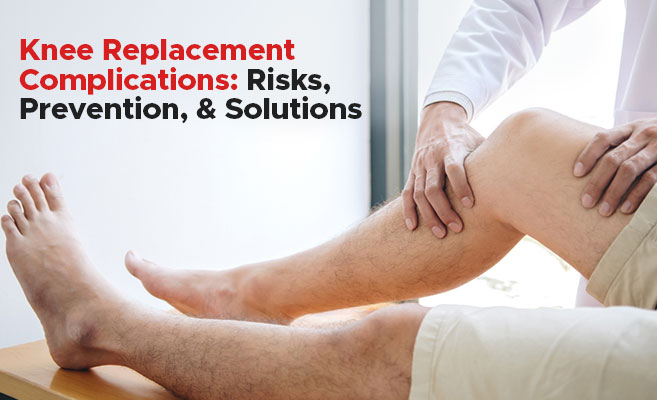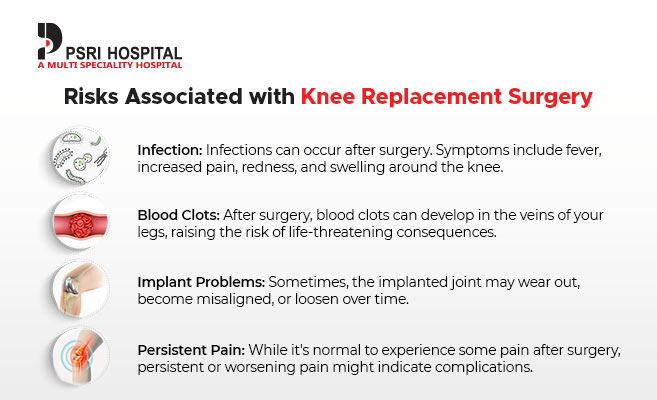Knee Replacement Complications: Risks, Prevention, and Solutions

Knee replacement surgery can be a life-changing procedure for many people suffering from severe knee pain and limited mobility. However, like any surgery, it comes with its own set of risks and complications. In this blog post, we will explore common knee replacement complications, how to prevent them, and potential solutions to ensure a successful recovery.
Understanding Knee Replacement Complications
Knee replacement concerns vary from person to person, but typical dangers include infection, blood clots, issues with the implant, and persistent soreness. It’s crucial to be aware of these potential problems. Infections can produce redness and swelling, while blood clots may cause serious issues.
The joint’s effectiveness could be hampered over time by implant issues. Furthermore, it is concerning if pain continues after surgery. Following medical advice, keeping a clean environment, and attending to any unusual symptoms as soon as they appear are essential components of a successful knee replacement recovery that will lower these risks.
Risks Associated with Knee Replacement Surgery

- Infection: Infections can occur after surgery. Symptoms include fever, increased pain, redness, and swelling around the knee. Proper hygiene and post-operative care are crucial in preventing infections.
- Blood Clots: After surgery, blood clots can develop in the veins of your legs, raising the risk of life-threatening consequences. Moving around as soon as you can after surgery and taking blood thinners according to directions will reduce this risk.
- Implant Problems: Sometimes, the implanted joint may wear out, become misaligned, or loosen over time. Regular check-ups with your healthcare provider can help in detecting and addressing these issues early.
- Persistent Pain: While it’s normal to experience some pain after surgery, persistent or worsening pain might indicate complications. Consult your doctor if you notice any unusual discomfort.
Preventing Knee Replacement Complications
- Follow the Doctor’s Advice: Listen to your healthcare provider’s instructions carefully. This includes medications, physical therapy, and activity restrictions.
- Maintain a Healthy Lifestyle: Adopting a healthy diet, regular exercise, and maintaining a healthy weight can significantly reduce the risk of complications.
- Quit Smoking: If you smoke, quitting can improve your overall health and reduce the risk of post-surgical complications.
- Practice Good Hygiene: Proper wound care and personal hygiene can prevent infections. Keep the surgical area clean and dry.
Solutions for Knee Replacement Complications
- Physical Therapy: Physical therapy can be incredibly beneficial if you have discomfort or difficulties moving your knee. Your mobility will increase, and your knee will become stronger with the help of therapy exercises.
- Medications: To treat pain and inflammation, your doctor may recommend medication. To guarantee a comfortable recovery, it’s essential to take them exactly as instructed.
- Revision Surgery: If the implant has serious problems, revision surgery may be required. In order to address issues, this involves changing part or all of the original prosthesis’s components.
Conclusion
While knee replacement surgery can improve mobility and provide relief from chronic pain, it’s important to be aware of any potential consequences and take preventative measures to avoid them. You can drastically lower your chance of knee replacement complications by adhering to your doctor’s advice, leading a healthy lifestyle, and being alert for any unexpected symptoms.
Remember, early detection and timely intervention are key to a successful recovery. If you have concerns or questions about your knee replacement surgery, always consult your healthcare provider for personalized guidance. So, if you are looking for the best doctor for knee replacement surgery, We have an expert team of doctors who can help you with this. PSRI Hospital is here to help you. Book an appointment now to know more about knee replacement surgery cost in Delhi.
FAQs
- Q: What are the common signs of infection after knee replacement surgery?
A: Common signs of infection include increased pain, redness, swelling, warmth around the knee, and fever. If you notice any of these symptoms, it’s crucial to contact your healthcare provider immediately for proper evaluation and treatment.
- Q: How can I reduce the risk of blood clots after knee replacement surgery?
A: Moving your legs regularly, as soon as possible after surgery, and following your doctor’s prescribed blood thinners can significantly reduce the risk of blood clots. It’s important to stay active within the limits recommended by your healthcare provider.
- Q: Is it normal to experience some pain after knee replacement surgery?
A: Yes, it’s normal to experience some pain after surgery, but it should gradually improve as you heal. However, persistent or worsening pain could indicate complications. Always report any unusual pain to your healthcare provider for evaluation and appropriate management.
- Q: Can complications with knee implants be fixed without another surgery?
A: In some cases, minor implant issues can be addressed without surgery. Regular check-ups with your healthcare provider can help detect problems early. However, if significant issues are detected, revision surgery might be necessary to replace or adjust the implant components.
- Q: How long does the recovery process after knee replacement surgery usually take?
A: The recovery period varies for each individual but typically involves a few weeks of physical therapy and several months of gradual improvement. Full recovery can take up to a year. It’s essential to follow your rehabilitation plan, attend follow-up appointments, and communicate any concerns to your healthcare team for a smooth recovery process.

 Book An Appointment
Book An Appointment Virtual Consultation
Virtual Consultation





